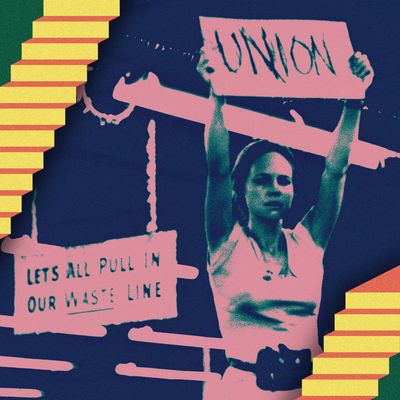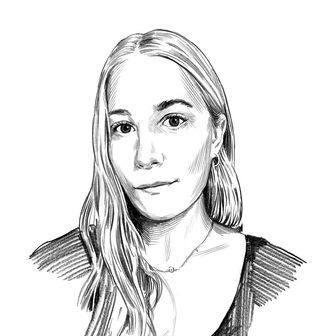
In this micro-series, the Cut revisits five Hollywood classics about female ambition.
The scene most people remember from Norma Rae comes at the climax of the 1979 film, when Sally Field, a.k.a. Norma Rae, stands on top of a machine in the textile factory where she works holding a sign that reads “Union.” It is one last act of protest, after Norma has been fired by her tyrannical bosses for trying to organize her co-workers. As she clutches her sign silently, her fellow factory workers turn off the machines they operate one by one until the floor, usually booming with noise, is silent.
It’s an iconic moment for good reason — the solidarity on display is incredibly moving, as Norma’s comrades put their own jobs at risk to support her. Together, individual actions amount to a powerful force, encapsulating the major theme of this movie about labor rights, collective bargaining, and equality. The bosses are forced to let Norma’s demonstration continue, before they haul her down and throw her in a police car.
But I always think about what happens next, after Norma is released. She enters her small house and walks past the two men there — her husband, Sonny, and union organizer Reuben — with incredible purpose, straight to the bedroom of her children. “Wake up, honey,” she gently coos to each one, taking them to the living room, where she sits them down. “The thing is,” she says, “I’m a jailbird.” Norma subsequently reveals every possible rumor and insult that could be spread about her in her small Alabama town now that she has been fired as a rabble-rouser: that her children have different fathers, that she has slept around. Norma gives each one a picture of their daddy. “Now you know what I am,” she says, “And you know that I believe in standing up for what I think is right.”
There is something wildly intimate about this moment, in part because of the stripped-down style of the filmmaking, in which Field, as Norma, is constantly bathed in a glow of sweat, her hair sticking to her face. It also situates Norma’s activism within her role as a mother rather than outside of it, something that feels radical for a piece of art made more than 40 years ago. There is the big denouement at the factory — and, later, celebration when the union wins its election — but there is also this quieter aftermath, when Norma reveals the drive behind her efforts to improve her working conditions. It’s not about her, really, at all. It’s about her kin. “If you go in the mill, I want life to be better for you than it is for me,” she says. Rather than an individualistic kind of ambition, Norma’s aspirations are about making the world a better place for her family.
At the time, Norma Rae was a sensation, with Field winning an Oscar for Best Actress and the film a nomination for Best Picture. The story was based on a real-life labor activist, Crystal Lee Sutton, who was fired for organizing her co-workers at her textile factory in North Carolina. Sutton, too, was a single mother, who later said even union organizers snubbed her because they felt “ashamed” of her.
Today, the movie feels somehow even more urgent, given that four decades of labor activism, third-wave feminism, and the equal-pay movement have still left women lagging behind men in terms of compensation (and suffering far more in pandemic unemployment). In 2020, across the United States, women lost jobs because they became default child-care providers, or because they hold a greater proportion of low-paid, low-protection service and retail jobs. Norma Rae is a reminder that true ambition is collective. Feminist solidarity means ensuring all kinds of labor is uplifted and fairly paid, for all kinds of women. You can imagine a Norma Rae reboot in which Norma promotes her way through the factory to become in charge herself, a girlboss version of events in which the conditions for the rest of her co-workers remain unchanged. The original is much better.
More From This Series
- Did Black Swan Predict the Plight of the Modern Worker?
- Love & Basketball Doesn’t Sacrifice Anything for the Happy Ending
- Where Is the Future That Baby Boom Promised?


